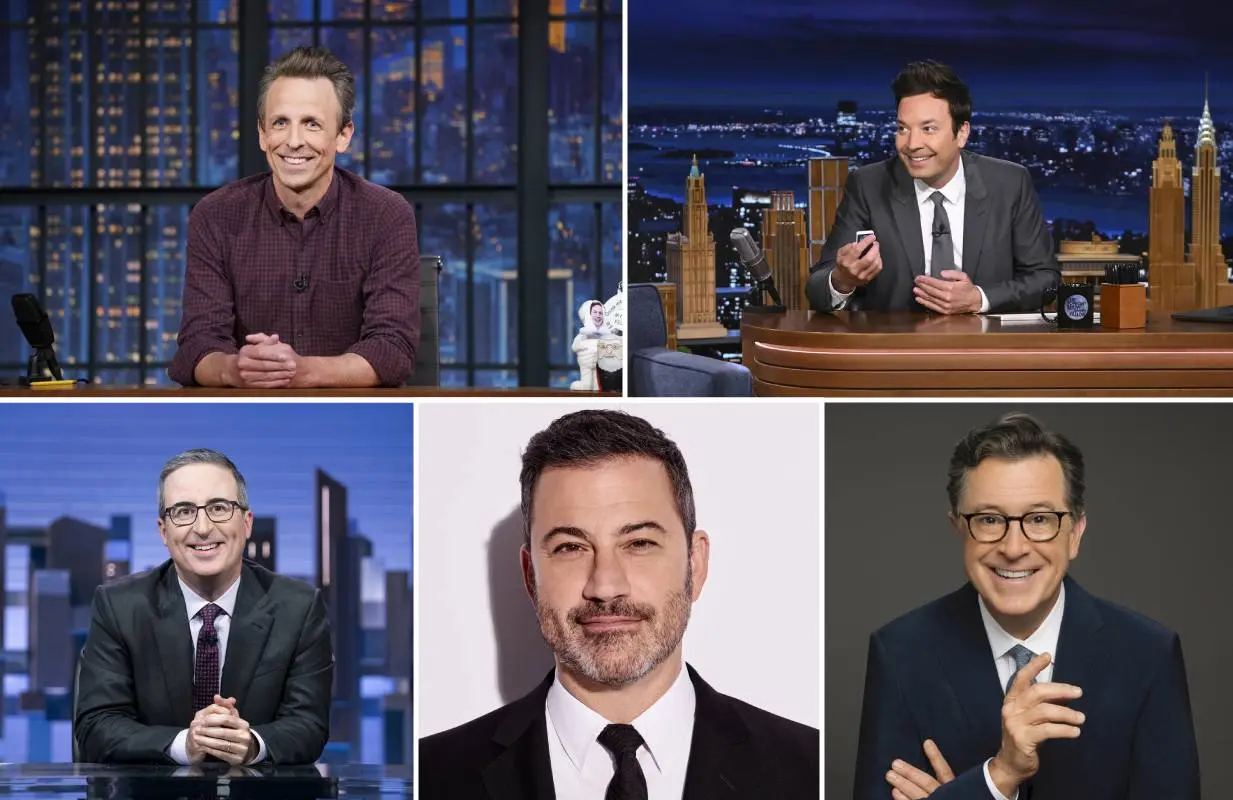Strike Force Five Is Like an Unofficial Battle of the Late Night Hosts
-
 Five straight white men — Seth Meyers, Jimmy Fallon, John Oliver, Jimmy Kimmel, and Stephen Colbert — hosting a podcast isn’t exactly revolutionary. (Photo: Lloyd Bishop/NBC; Todd Owyoung/NBC; HBO; ABC/Jeff Lipsky; Gail Schulman/CBS)
Five straight white men — Seth Meyers, Jimmy Fallon, John Oliver, Jimmy Kimmel, and Stephen Colbert — hosting a podcast isn’t exactly revolutionary. (Photo: Lloyd Bishop/NBC; Todd Owyoung/NBC; HBO; ABC/Jeff Lipsky; Gail Schulman/CBS)Strike Force Five was conceived with solidarity in mind. The podcast — co-hosted by Stephen Colbert, Jimmy Fallon, Jimmy Kimmel, Seth Meyers, and John Oliver — is a continuation of weekly chats the five late night hosts have been having over Zoom since the Writers Guild of America went on strike in May. The last time the WGA went on strike, not all talk show hosts were on the same page. Kimmel and Colbert were there and remember a disconnect in the community when David Letterman and Craig Ferguson returned to work before the strike was resolved. (Worldwide Pants, Letterman’s production company which also owned The Late Late Show, came to an interim agreement with studios eight weeks into the 2007 strike so that those shows could go on.) These weekly conversations started as an attempt to make sure everyone in the talk show sector was on the same page.
The podcast takes the mission a step further. The hosts gather to talk about the ins and outs of the industry and share stories from their personal lives, and all the money they make goes directly to their striking staff. Even though only one episode has been released so far, some major sponsors are making sure the money rolls in from the start: liquor company Diageo (which makes Casamigos Tequila and Aviation Gin, among others) and Ryan Reynolds’ phone company Mint Mobile back the podcast, and Reynolds himself recorded a special ad for the debut episode. It’s all very noble.
The content of the show itself, however, is a telling representation of the late night landscape. Right from the beginning Kimmel, who is the de facto lead host because of his radio experience and his access to a soundboard, “jokes” about the fact that the series is giving a platform to five famous white men. The punchline doesn’t quite land, though, especially as the episode progresses and it becomes a bro-down of rich white men swapping stories about celebrity encounters and attempting to one up each other every step of the way. It may not be the intention of the series, but the friendly sparring over who gets the spotlight (or whatever the audio equivalent would be) feels like an unofficial battle between to be the top late night star.
The attempts to steal focus do uncover some never-before-publicly-shared details. Kimmel, for instance, admits that he was gearing up to retire just before the strike hit — now, though, the time off has made him ready to get back to work. At one point, the episode devolves into everyone sharing their best stories about encounters with celebrity pants, and Colbert shares that he still has a pair of pants that belonged to Anastasio Somoza, the murderous Nicaraguan dictator. His mother, he tells the others, briefly dated him before he did all that unforgivable stuff. She held onto his uniform and eventually passed it on to her son.
Entertaining as some of those revelations may be, they reveal just how unrelatable these men are. Kimmel has the option to work or not, depending on how bored he gets, and the very fact that celebrity pants is a topic that everyone can contribute to shows how far outside of the realm of reality these hosts live. They discuss their celebrity rolodexes and the fake names they hide their most famous friends under in their phones, talk about going on fishing trips together during the strike, and add tag after tag after tag to each others’ jokes to try to get the last laugh. There’s barely any room for the hosts to breathe, let alone a listener to process if the jokes being said are actually funny or not.
Meyers and Oliver take a more subtle approach than the Jimmys and Stephen, sitting back and waiting for their moment to jump in instead of attempting to talk over everyone else. They provide a respite and a reflection of where their respective shows sit in the landscape — somewhat on the outskirts and trying to do things a little differently. But even those moments of reprieve aren’t enough to disguise the fact that the biggest names in late night are all white men.
The ability to create and make money off a podcast, especially during a strike, is only afforded to the most privileged in the industry. The majority of striking workers have to pick up temp work or take shifts at coffee shops and bars to make ends meet during the strike. There’s little time or, under guild rules, allowance to pursue creative work of any kind until the AMPTP offers a fair contract. So, those who are prominently making new work are a representation of who is least affected by the strike. Strike Force Five is commendable for providing financial support to those less fortunate, but it’s also a reminder of who is still coming out on top in the industry.
Brianna Wellen is a TV Reporter at Primetimer who became obsessed with television when her parents let her stay up late to watch E.R.
TOPICS: Strike Force Five, Jimmy Fallon, Jimmy Kimmel, John Oliver, Seth Meyers, Stephen Colbert, TV Actors' Strike, TV Writers' Strike